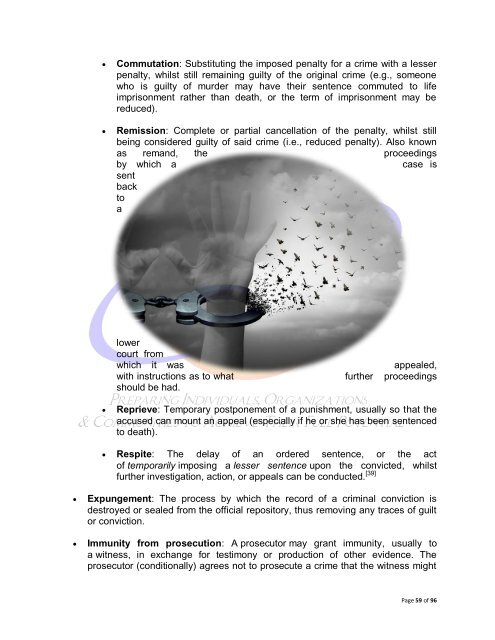Law for The Poor
Law for The Poor
Law for The Poor
You also want an ePaper? Increase the reach of your titles
YUMPU automatically turns print PDFs into web optimized ePapers that Google loves.
Commutation: Substituting the imposed penalty <strong>for</strong> a crime with a lesser<br />
penalty, whilst still remaining guilty of the original crime (e.g., someone<br />
who is guilty of murder may have their sentence commuted to life<br />
imprisonment rather than death, or the term of imprisonment may be<br />
reduced).<br />
Remission: Complete or partial cancellation of the penalty, whilst still<br />
being considered guilty of said crime (i.e., reduced penalty). Also known<br />
as remand, the proceedings<br />
by which a<br />
case is<br />
sent<br />
back<br />
to<br />
a<br />
lower<br />
court from<br />
which it was appealed,<br />
with instructions as to what further proceedings<br />
should be had.<br />
<br />
Reprieve: Temporary postponement of a punishment, usually so that the<br />
accused can mount an appeal (especially if he or she has been sentenced<br />
to death).<br />
Respite: <strong>The</strong> delay of an ordered sentence, or the act<br />
of temporarily imposing a lesser sentence upon the convicted, whilst<br />
further investigation, action, or appeals can be conducted. [39]<br />
<br />
<br />
Expungement: <strong>The</strong> process by which the record of a criminal conviction is<br />
destroyed or sealed from the official repository, thus removing any traces of guilt<br />
or conviction.<br />
Immunity from prosecution: A prosecutor may grant immunity, usually to<br />
a witness, in exchange <strong>for</strong> testimony or production of other evidence. <strong>The</strong><br />
prosecutor (conditionally) agrees not to prosecute a crime that the witness might<br />
Page 59 of 96

















